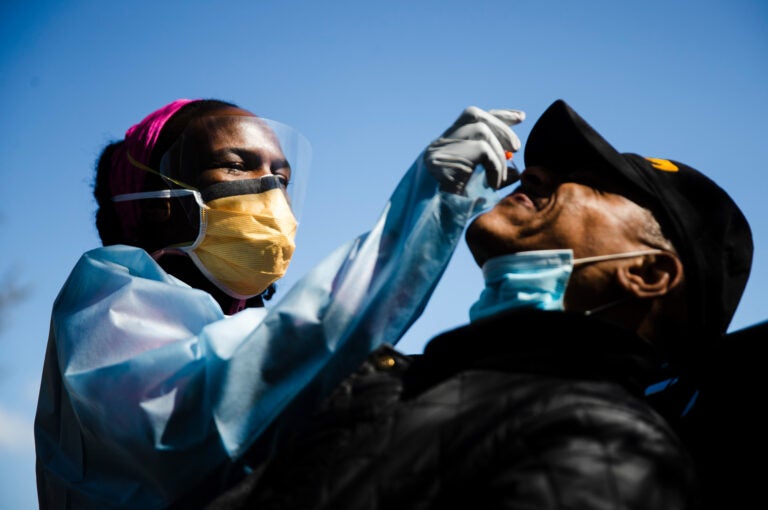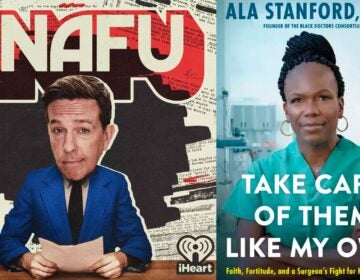COVID and communities of color: health disparities and vaccine hesitancy
Black and Hispanic Americans have been hit the hardest by COVID. We'll look at the racial disparities, the effort to address them, and the high rates of vaccine hesitancy.
Listen 49:30
Dr. Ala Stanford administers a COVID-19 swab test on Wade Jeffries in the parking lot of Pinn Memorial Baptist Church in Philadelphia, Wednesday, April 22, 2020. Stanford and other doctors formed the Black Doctors COVID-19 Consortium to offer testing and help address heath disparities in the African American community. (AP Photo/Matt Rourke)
Communities of color have been hit hard by the pandemic, with higher rates of infections, hospitalizations and deaths compared to white Americans. We look at the racial disparities that COVID has laid bare, including poor access to health care and greater exposure to the virus. We’ll talk about what is being done to address these inequities and discuss the high rates of vaccine hesitancy among African Americans. Our guests are DR. ALA STANFORD, founder of the Black Doctors COVID-19 Consortium, and DR. FLORENCE MOMPLAISIR, associate professor of medicine at the University of Pennsylvania Perelman School of Medicine. But first, we check in on the vaccine rollout in our region with DR. CAROLINE JOHNSON, deputy health commissioner of Philadelphia.

Subscribe for more Radio Times
Interview highlights
On keeping track of vaccination doses:
Marty Moss-Coane: Now we’re talking about vaccines which really require two doses to get the maximum protection. How will you keep track of that? Will people have a card once they get their second dose? Will they have some kind of a card that says that they have been fully vaccinated?
Dr. Caroline Johnson: Yes. So the best strategy to make sure people get second doses is to give them the appointment for the second dose when they get the first dose. And that is what almost everybody is doing right now. We hand people an appointment date and time with the expectation that they come back. They will also be given a vaccination card that records exactly what product they got, what date they got it, and when they need the second dose.
On Dr. Stanford getting the vaccine:
MMC: This was earlier this week, the first person in the United States to be vaccinated was a woman of color from Jamaica. What was your takeaway from her message?
Dr. Ala Stanford: It’s a sentiment that I share, you know, having received the vaccine yesterday. You don’t expect the emotion. You know, there is some fear. I think that’s natural. You go through the questions, you give consent. And for myself and my staff…we just held each other and cried because we’ve seen so much death. We’ve seen family members pass away. You know, we’ve taken care of a lot of sick folks. And in that moment, it was just a relief for the possibility of getting to brighter days.
On vaccine mistrust among communities of color:
MMC: I know that you’ve done some focus groups with black barber shops, black salons — a chance to talk to people to find out where some of this mistrust has come from. I know some of it is historic involving Tuskegee and other experiments on Black Americans. But I wonder whether there’s something about this particular virus and even vaccine because of the politicized year that we have been living through. Can you speak to that?
Dr. Florence Momplaisir: Well, absolutely. I think there was a lot of reluctance due to the fact that people linked the vaccine to the Trump administration, which for the most part was seen as the picture of white supremacy. Why are you coming into our community and giving us this vaccine when, in reality, we’re seeing our family members being mistreated and dying in the hands of police officers. So there was a lot of concern and mistrust around the process, particularly with the flip flopping of the FDA and also the CDC with testing recommendations. So they felt very confused and felt that they didn’t really know where to go to have a trusted voice through this process. And I’m hoping that with the change of administration that perhaps some of the skepticism is going away.
WHYY is your source for fact-based, in-depth journalism and information. As a nonprofit organization, we rely on financial support from readers like you. Please give today.





